DAVAO CITY (MindaNews / 04 April) — The National Democratic Front (NDF) wants the Comprehensive Agreement on Socio-Economic Reforms (CASER) signed first before the bilateral ceasefire agreement, or both can be signed simultaneously.
“The people demand that CASER be a step ahead of the joint ceasefire agreement, unless these agreements can be signed at the same time by the panels and then by the principals,” Jose. Ma. Sison, NDF chief political consultant and founding chair of the Communist Party of the Philippines (CPP) said at the opening of the fourth round of formal peace talks on April 3 in The Netherlands.
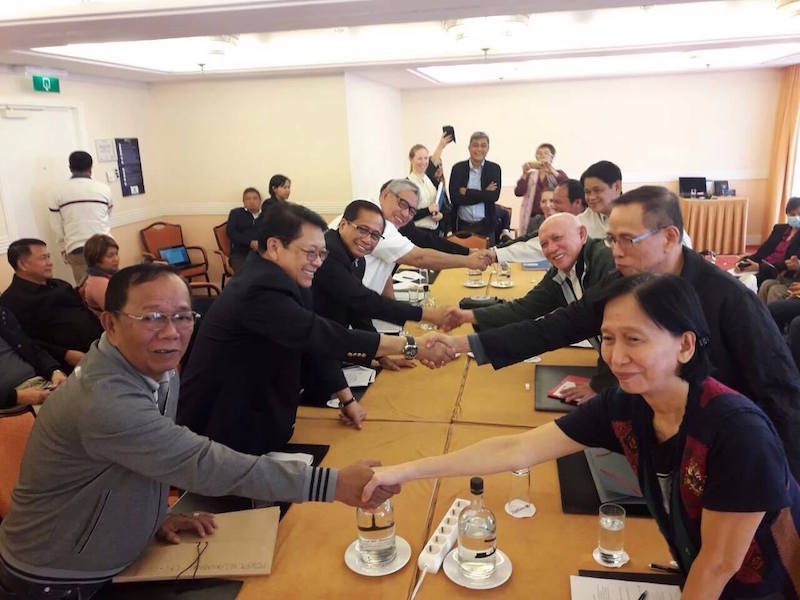 Meeting between the government and National Democratic Front of April 4 in The Netherlands, on the second day of the 4th round of formal peace negoitations. Four ceasefire meetings have been scheduled for April 4 and 5. Photo courtesy of NDF International Information Office
Meeting between the government and National Democratic Front of April 4 in The Netherlands, on the second day of the 4th round of formal peace negoitations. Four ceasefire meetings have been scheduled for April 4 and 5. Photo courtesy of NDF International Information Office
NDF peace panel chair Fidel Agcaoili said CASER is “the heart and soul” of the peace negotiations to end half-a-century of armed struggle. He reiterated “the wisdom of securing the approval of the CASER ahead of any bilateral ceasefire agreement, unless both agreements can be signed simultaneously.”
“It is important to stress this as the issue of ceasefire should not be pursued as an end itself. Ceasefires, whether unilateral or bilateral, are just a means to an end. Its main purpose is to create conditions conducive to reaching agreements on basic reforms that are satisfactory to both sides,” Agcaoili said.
Sison said he is optimistic the CASER will be signed within the year since the respective versions of the GRP and NDF share similar positions.
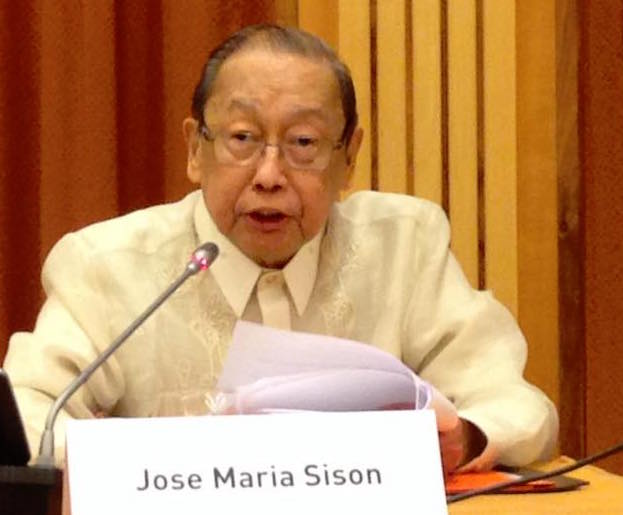 “The people demand that CASER be a step ahead of the joint ceasefire agreement, unless these agreements can be signed at the same time by the panels and then by the principals,”NDF chief political consultant Jose Ma. Sison said. Photo courtesy of NDF International Information Office
“The people demand that CASER be a step ahead of the joint ceasefire agreement, unless these agreements can be signed at the same time by the panels and then by the principals,”NDF chief political consultant Jose Ma. Sison said. Photo courtesy of NDF International Information Office
“I have read and studied the drafts of the proposed agreements from the GRP and NDFP and I have also examined the comparative matrices. I observe that there are enough concurrences and similar positions as common ground for forging the agreements,” said Sison, college professor of President Rodrigo Roa Duterte in Political Thought.
Ceasefire
Agcaoili said it is possible to have a bilateral ceasefire agreement “that conforms to the position that simultaneous and reciprocal declarations of unilateral ceasefire can be agreed upon and bound by a Memorandum of Understanding that shall be issued at the end of the fourth round of formal talks.”
Sison said the reciprocal working committees on CASER can also accelerate the unification of their respective drafts during formal talks and work meetings.
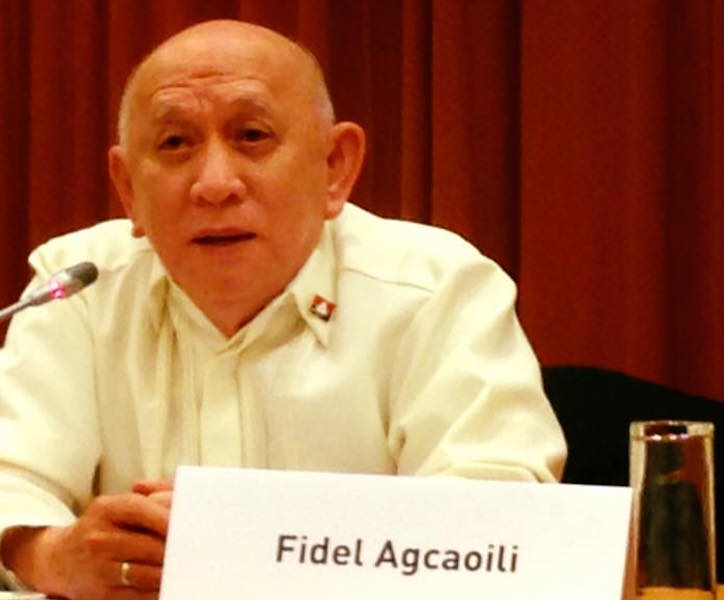 NDF peace panel chair Fidel Agcaoili says “the issue of ceasefire should not be pursued as an end itself.” Photo courtesy of NDF International Information Office
NDF peace panel chair Fidel Agcaoili says “the issue of ceasefire should not be pursued as an end itself.” Photo courtesy of NDF International Information Office
He said the agreed version of CASER will serve as guide and framework of executive orders and legislations “to carry out genuine land reform, lay the foundation of national industrialization, ensure the protection of the environment and wise utilization of natural resources, uphold the people’s rights, improve the wage and living conditions, expand the social services and develop international economic relations within the contect of an independent foreign policy.”
He said the parties can sign the Comprehensive Ageement on Political and Constitutional Reforms (CAPCR) within three months after signing the CASER since the reciprocal working groups have drafted their respective versions in advance.
‘Stay the course’
Presidential Adviser on the Peace Process (PAPP) Jesus Dureza encouraged both panels to “stay the course.”
On February 1, New Peoples’ Army (NPA), the armed wing of the CPP, announced the termination of the ceasefire effective 11:59 p.m. on February 10. Duterte announced the lifting of the ceasefire on February 3.
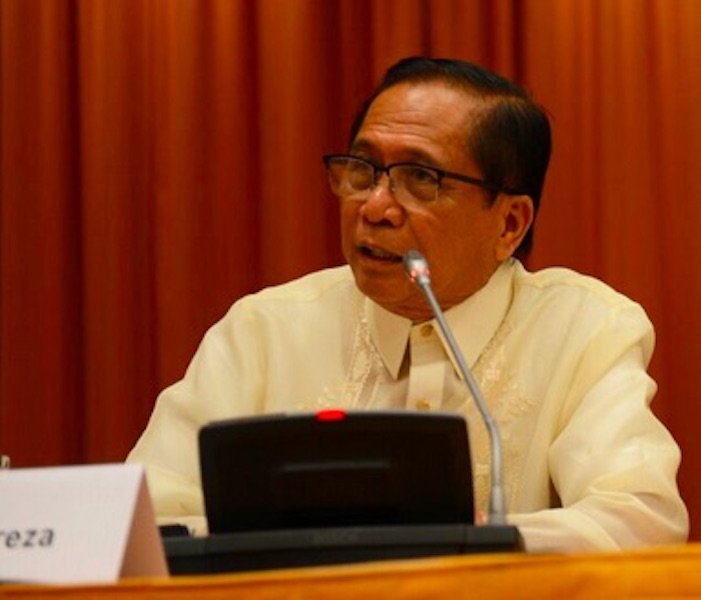 “Let’s stay the course,” Presidential Adviser on the Peace Process Jesus Dureza.says. Photo courtesy of OPAPP
“Let’s stay the course,” Presidential Adviser on the Peace Process Jesus Dureza.says. Photo courtesy of OPAPP
“The road to peace is never a paved one. It will be full of bumps and bends. Let us stay the course,” he said.
He said they will work on a more stable bilateral ceasefire agreement, as he emphasized that both peace panels have “never gone this far before” in the negotiations.
“We have already agreed on the final outcome of the talks – lasting peace and sustainable development. This is not a case of one party giving in or giving up,” he said.
Giving all for peace
Labor Secretary Silvestre Bello III, chair of the GRP peace negotiating panel, said “negotiations, as in other peace process elsewhere, is all about finding common ground in diversity”.
He said the GRP panel also welcomes the openness of the NDF to forge a joint interim ceasefire.
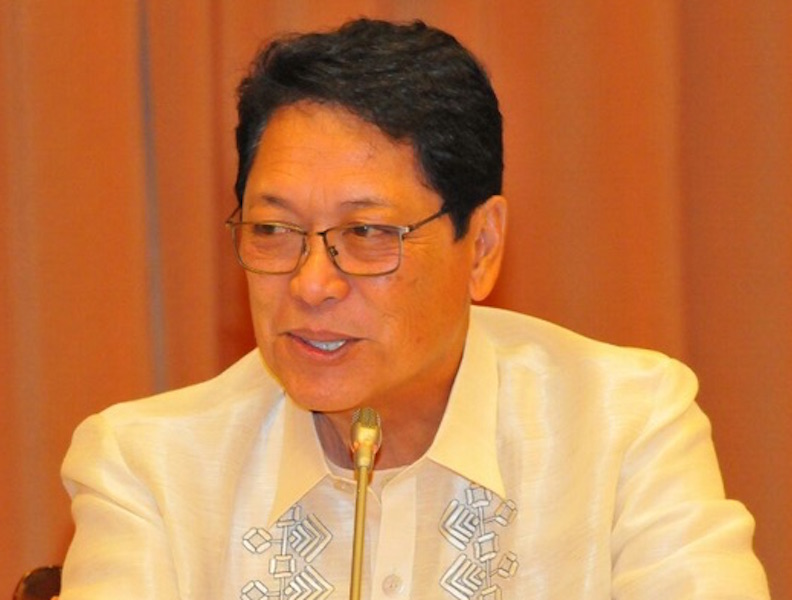 Government peace panel chair Silvestre Bello III says thiis not about giving in or giving up but giving all for peace. Photo courtesy of OPAPP
Government peace panel chair Silvestre Bello III says thiis not about giving in or giving up but giving all for peace. Photo courtesy of OPAPP
“A ceasefire that marches in step with the discussion of the socio-economic reforms that will address the root causes of armed conflict,” he said.
“As you all agree with me, the forging of the ceasefire agreement is not about ‘giving in’ or ‘giving up’, it is about ‘giving all’ for peace. This is the covenant of President Duterte to our people. And as peace workers ourselves, we should be one with him,” Bello said.
Free land distribution
In a press release, Bayan Muna Rep. Carlos Isagani Zarate, vice chair of the House Committee on Peace, Reconciliation and Unity said they welcome the opening of the fourth round of talks and hopes the parties would focus on crafting the CASER.
“We also welcome the respective statements of both panels to forge a ceasefire agreement and to hasten the release of political prisoners,” he said.
He added that Bayan Muna supports the free land distribution to farmers, this being a key factor of CASER, and hopeful that “50 years of bogus land reform programs” will come to an end.
He said the Republic Act 9700, or the Comprehensive Agrarian Reform Program Extension with Reforms (CARPER), passed in 2009 to strengthen Republic Act (RA) 6657, or the Comprehensive Agrarian Reform Program (CARP), has done little to uplift the conditions of the farmers.
“It is imperative that free land be given to those who till them because they are the ones investing sweat and blood to feed the nation but they are the ones with nothing to eat,” he added.
He said the Makabayan bloc has proposed the House Bill 555 or the Genuine Agrarian Reform Program that proposes to give free land to farmers. (Antonio L. Colina IV / MindaNews)
